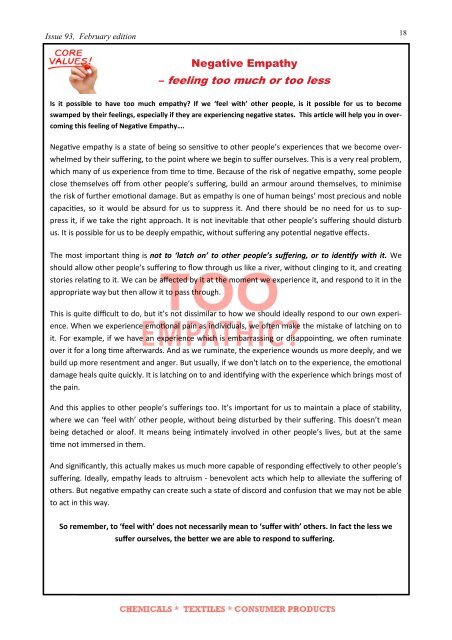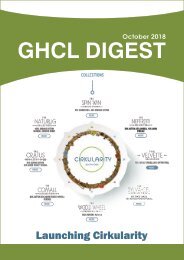GHCl Digest - JANUARY 2018
GHCl Digest - JANUARY 2018
GHCl Digest - JANUARY 2018
You also want an ePaper? Increase the reach of your titles
YUMPU automatically turns print PDFs into web optimized ePapers that Google loves.
Issue 93, February edition<br />
18<br />
Negative Empathy<br />
– feeling too much or too less<br />
Is it possible to have too much empathy? If we ‘feel with’ other people, is it possible for us to become<br />
swamped by their feelings, especially if they are experiencing nega$ve states. This ar$cle will help you in overcoming<br />
this feeling of Nega$ve Empathy….<br />
Negave empathy is a state of being so sensive to other people’s experiences that we become overwhelmed<br />
by their suffering, to the point where we begin to suffer ourselves. This is a very real problem,<br />
which many of us experience from me to me. Because of the risk of negave empathy, some people<br />
close themselves off from other people’s suffering, build an armour around themselves, to minimise<br />
the risk of further emoonal damage. But as empathy is one of human beings’ most precious and noble<br />
capacies, so it would be absurd for us to suppress it. And there should be no need for us to suppress<br />
it, if we take the right approach. It is not inevitable that other people’s suffering should disturb<br />
us. It is possible for us to be deeply empathic, without suffering any potenal negave effects.<br />
The most important thing is not to ‘latch on’ to other people’s suffering, or to idenfy with it. We<br />
should allow other people’s suffering to flow through us like a river, without clinging to it, and creang<br />
stories relang to it. We can be affected by it at the moment we experience it, and respond to it in the<br />
appropriate way but then allow it to pass through.<br />
This is quite difficult to do, but it’s not dissimilar to how we should ideally respond to our own experience.<br />
When we experience emoonal pain as individuals, we oBen make the mistake of latching on to<br />
it. For example, if we have an experience which is embarrassing or disappoinng, we oBen ruminate<br />
over it for a long me aBerwards. And as we ruminate, the experience wounds us more deeply, and we<br />
build up more resentment and anger. But usually, if we don't latch on to the experience, the emoonal<br />
damage heals quite quickly. It is latching on to and idenfying with the experience which brings most of<br />
the pain.<br />
And this applies to other people’s sufferings too. It’s important for us to maintain a place of stability,<br />
where we can ‘feel with’ other people, without being disturbed by their suffering. This doesn’t mean<br />
being detached or aloof. It means being inmately involved in other people’s lives, but at the same<br />
me not immersed in them.<br />
And significantly, this actually makes us much more capable of responding effecvely to other people’s<br />
suffering. Ideally, empathy leads to altruism - benevolent acts which help to alleviate the suffering of<br />
others. But negave empathy can create such a state of discord and confusion that we may not be able<br />
to act in this way.<br />
So remember, to ‘feel with’ does not necessarily mean to ‘suffer with’ others. In fact the less we<br />
suffer ourselves, the beJer we are able to respond to suffering.











